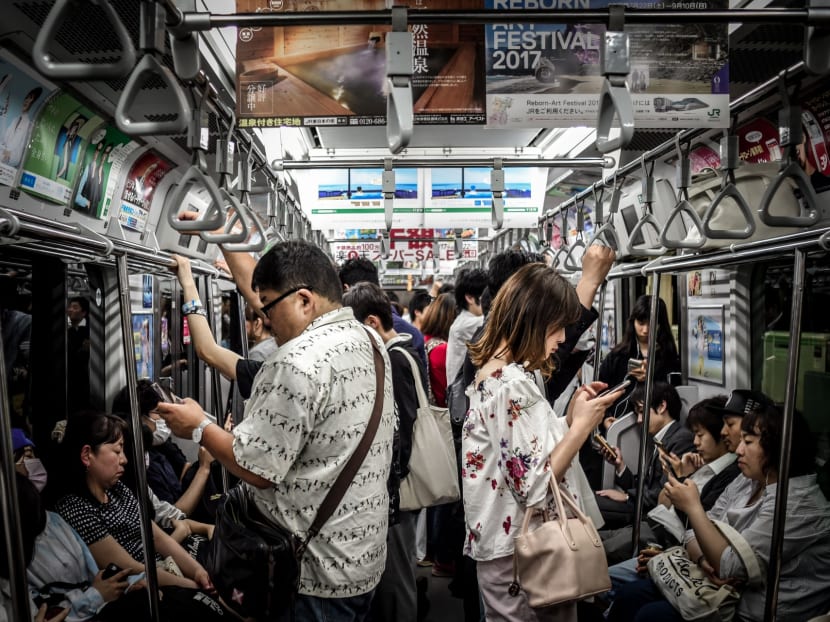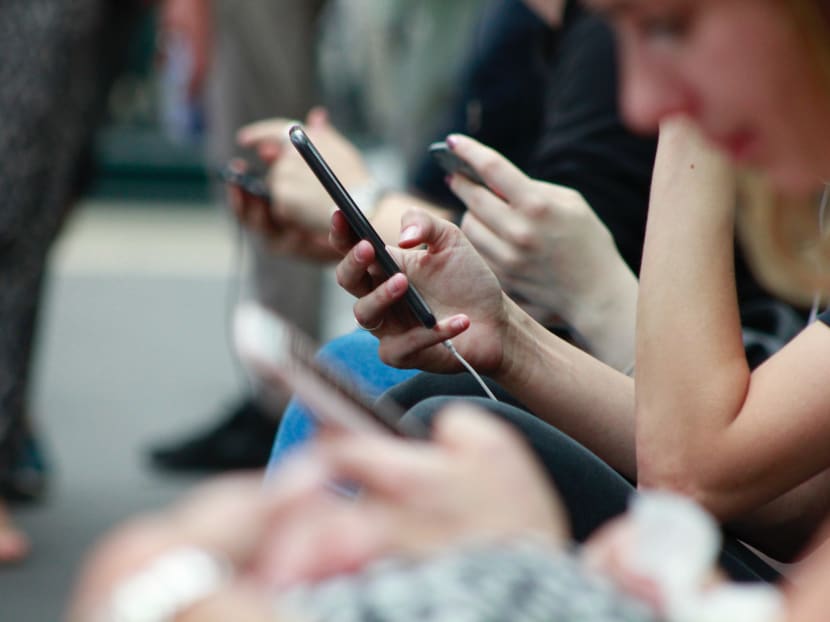How social media and games are like drug addiction and gambling
HONG KONG — Walking, reclining, dining, playing, commuting, shopping: People around the world read their smartphones regardless of where they are or what they're doing, unable to tear their eyes from their screens regardless of whether they're on a crowded street or working out at the gym.
HONG KONG — Walking, reclining, dining, playing, commuting, shopping: People around the world read their smartphones regardless of where they are or what they're doing, unable to tear their eyes from their screens regardless of whether they're on a crowded street or working out at the gym.
Mr Adam Alter, an author and professor of marketing at New York University's Stern School of Business, believes modern technology has never been so "efficient and addictive".
In his 2017 book, Irresistible: The Rise of Addictive Technology and the Business of Keeping Us Hooked, he describes the problems of rampant behavioural addiction and the calculated ways games, apps and other tech products get and hold our attention.
"We thought addiction was mostly related to chemical substances: Heroin, cocaine and nicotine. Today, people spend three hours a day tethered to their cellphones, and Snapchat boasts that its youthful users open their app more than 18 times a day," he says.
When Mr Alter read that Apple co-founder and tech titan Steve Jobs refused to let his children use the iPad when it was released, he decided to investigate further.
In a Ted Talk he gave in April 2017, titled Why Screens Make us Less Happy, he said Mr Jobs' decision struck him as unusual because one of the golden rules in business holds that executives should use their own products. His subsequent investigations added further fuel to the fire.
"I discovered that the Waldorf School of the Peninsula in Silicon Valley doesn't allow any tech — no iPhones or iPads — for under 11-year-olds and that 75 per cent of the parents are tech executives," he says.
Mr Alter decided to find out why experts considered their own products to be so potentially dangerous. He discovered that the programs and apps we use are laced with hooks that make them near impossible to resist.
Tech companies prey on our capacity for "behavioural addiction", which can significantly affect our relationships and mental health, he explains. Some of the hooks embedded in products to "catch" us include variable reinforcement through likes and shares on social media.
"Modern technology also lacks the 'stopping cues' that older mediums had built in, such as the end of a book chapter," he says.
"The feeds on social media platforms and games like World of Warcraft are effectively bottomless, making it harder to regulate our use. If I'm addicted, the minute I start firing up the game my brain will look like the brain of someone who's addicted to heroin and is preparing the next hit."

Mr Alter says social media, like gambling, has the uncertainty of reward built into it. "You post content and wait for feedback," he says.
"Sometimes you'll get a flood of engagement, other times none at all. It's that unpredictability, as well as the social feedback, that keeps people coming back."
Tech companies can mine big data to determine exactly what makes us click, as well as how and why.
Mr Alter says people's brains release the neurotransmitter dopamine when engaging with video games and smartphones, and seeing likes on Instagram posts. While this makes people feel wonderful in the short term, they soon build a tolerance and want more.
"When this becomes a way of scratching some psychological itch — loneliness, anxiety, depression, low self-esteem, boredom — if you are turning to some device or some experience to help you deal with that deficit, there's a good chance you're addicted," he says.
The long-term consequences of technology addiction can be social, he adds, disrupting people's lives and preventing them from spending quality time with their loved ones.
Children can be particularly affected by excessive internet use, which can limit both their attention spans and their understanding of how to navigate the social world.
"(The consequences) can also be financial, with people spending thousands of dollars on in-game purchases; and even physical, as people who don't get exercise end up sitting on the couch for long periods," he says.
Perhaps worst of all, consequences can be psychological and addicts can become withdrawn, anxious, depressed and, in some cases, suicidal, he adds.
In Hong Kong, a survey last year of 97 young people aged 13 to 25 found they spent, on average, eight-and-a-half hours a day on mobile phone applications, mostly social media.
The survey, conducted between March and May by the Hong Kong Playground Association, a non-government organisation providing social services for children and young people, also found that more than two-thirds of respondents said they used social media to find out what others were doing, more than half browsed websites and nearly half used social media for communication.
Mr Alter acknowledges that there are huge benefits associated with technology, and apps used for relaxation, exercise, reading, education and health can be enriching. Drawing on his own experience, he says technology can be invaluable in connecting people who are remote.
"We need to ask ourselves what forms of screen use are bringing us benefit, and what forms are robbing us of our psychological well-being," he says.
"More often than not it's the gaming, 'doom scrolling' and social media feeds that leave a negative impact and should be limited."
Mr Alter also believes that jobs shouldn't require people to have a phone with them 24 hours a day.
"We need to ask why 70 per cent of the population can reach their phones without moving their feet 100 per cent of the time," he says.
"Functionally, these phones may as well be implants, and that says to me that something is broken, the culture needs fixing. You shouldn't be accessible by work 24 hours a day."
Addictive tendencies are inevitable if technology giants continue to thrive on a business model that requires engagement and attention, he says.
"If big tech companies worked on a subscription model — as newspapers and magazines do, for example — they'd be forced to cater to our welfare rather than to the needs of advertisers, who need as many people glued to the screen as possible at all times."
However, these corporations have no legal responsibility to make changes that would enhance the lives of their users, he explains.
"Morally and ethically, I think they have the same responsibility that big tobacco companies and alcohol companies have: To mitigate the harm they're doing, and pay economic or other penalties to address whatever harms they cause."
In some countries, the government has stepped in.
In 2011, South Korea enacted what is a called a Shutdown Law or Cinderella Law which forbids children under the age of 16 playing online video games between 12am and 6am. In 2019, China proposed a curfew that prohibited children under 18 playing online games between 10pm and 8am.
Mr Alter says people should find time each day to be as far away from screens as possible. "Your proximity to your phone determines how often you use it, so create times in the day when it's in a different room," he says.
He adds that rather than exercising self-control, people should put structures and habits in place to make disengaging easy, like placing a box in the kitchen that phones can be kept in.
"Make a family rule that dinner is screen-free, for example; don't use a phone in the hour before bed and for an hour after waking. Create as much space and time away from your phone, and find more time to be in natural environments."
He highlights one app, called Moment, which measures how long you spend on your phone and how many times you pick it up a day. Using the app made him realise how much he actually used his own phone.
"I thought I used my phone about an hour a day — in fact, I use my phone three hours a day, which is average in the United States."
Professional addiction support can be found at treatment centres in Hong Kong such as the Integrated Centre on Addiction Prevention and Treatment in Wan Chai, part of the Tung Wah Group of Hospitals, and The Cabin in Central, which provides counselling and treatment for addictive behaviours in a discreet outpatient setting.
Mr Alter believes that it is critical for schools to provide children with basic education on managing screen time and "digital hygiene" — how they can keep their digital world clean and safe.
"There are organisations now that focus on these questions — an important one in the US is called Intentionally Unplugged, which works with schools and teachers to implement such curricula," he says.
"Kids should learn how to manage screen time, why it's important, and the consequences of not managing it." SOUTH CHINA MORNING POST










